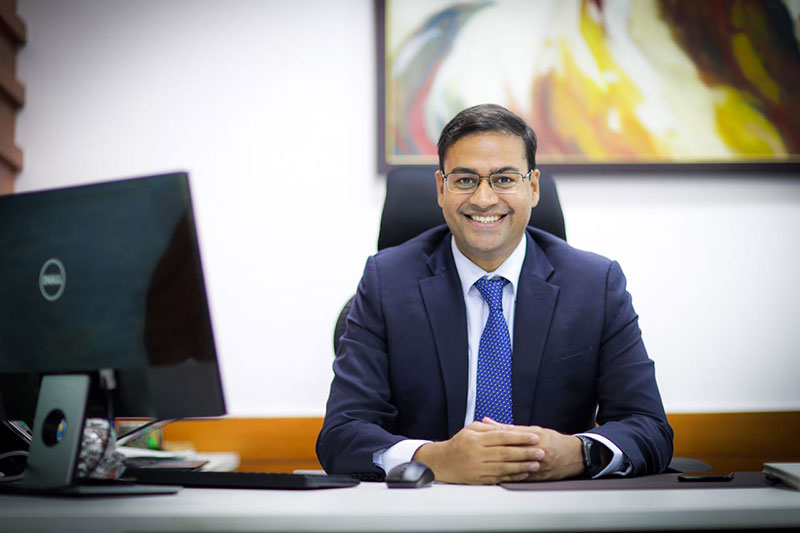Michelman offers solutions for coatings, printing and packaging, and industrial manufacturing markets. Its innovative surface additives and polymeric binders are used by leading manufacturers across the world to improve performance attributes and add value to various applications, including wood and floor care products, metal and industrial coatings, paints, varnishes, inks, fibers and composites.
An expert in the development of barrier and functional coatings as well as digital printing-press primers and OPVs that are used in the production of consumer and industrial packaging, paper products, labels, and commercially printed materials, Michelman offers effective solutions that allow its customers to apply these products in a broad array of end-use applications.
Michelman has production facilities in North America, Europe and Asia and product development and technical service centers in several major global markets.
In exclusive interviews given to Paper Mart, Steven J. Shifman, CEO, Michelman, and Shailesh Nema, Vice President and Managing Director, Michelman, reveal the secret behind their success and talk about the challenges they have faced and their long-term goals.
Paper Mart: Over the past 14 years, you have increased revenue and EBITDA by at least 3.5 times, and greatly expanded the company’s presence outside the United States. What do you attribute this success to?

Steven J. Shifman: I attribute this success to my amazing team and my colleagues. Michelman has a commitment to our purpose of forging a sustainable future. We have a strong set of values and we have been very fortunate to attract tremendous talent across the world, associates who share our passion for our vision and share our sense of values. I’m excited about the work they do; they solve big customer problems.
PM: How do you describe your corporate purpose and how do you help your employees share your vision for the company’s role in society?
SJS: Our purpose is very clear. We are all about forging a sustainable future; and when I unpack that and talk about each aspect of that purpose, that begins to bring much clarity for our associates. Everything we do is about innovations. The world is rapidly changing. If we are going to continue to thrive well into the future and help the world to solve its big problems, we have to continue to innovate as a company. We have to innovate and always look for a new, better, faster and a more creative way of doing things and solving problems. When we talk about sustainability, we talk about it in two ways. First of all, Michleman is a 70-year-old company and we are planning for the next 70 years. So we want to work to sustain our company well into the future. That’s why we practice what we call our triple bottom line people, planet and profit. We obviously want to earn a good return for our stakeholders, all of our shareholders, but we want to make sure that Michelman is a place where our associates can find fulfillment and meaning in their work. We also want to focus on the sustainability of the planet. So, what we do and everything we do with our science is working towards creating much more sustainable solutions. Our technology is water-based. We are actively working to help the packaging industry to create more recyclable and more sustainable materials. We are working to help the agricultural industry find ways to help feed a billion people on the planet. We are also helping light weight automobiles and airplanes with the work we do in the carbon fiber and composites industry. So, everything we do is around sustainability, building a business that will last for generations to come.
PM: How do you build rapport with your workers? Why do you think this is effective?
SJS: We have tremendously talented associates around the world. We hire people who have options to work in many places. We are thrilled they’ve chosen Michelman. By recognizing that, first and foremost, they are people, interesting people, before they are employees, we focus on the whole person, So I’d like to think that I build rapport with our associates because I like people; I like to spend time with people; I like to learn about people; I like to understand who they are, what they are interested in and their families. It’s not just about where they work and how they draw a pay check – that’s just one component of their lives. I try to build rapport with our associates by truly being interested in them and spending time with them and getting to know them as a whole person and not just an employee of Michelman.
PM: What are your values as a company leader? How do you ensure these values are upheld by employees?
SJS: I am fortunate that I share the same values as our company. We are a values-driven business; and I like to remind our associates that often times when I travel, the first thing I see in a company is its lobby. I see their values, but then when I ask the employees about the values of the company, most of them don’t have any idea what I’m talking about. At Michelman, although we are not perfect, it is something we work on every day. We want to make sure that we build our values into what we do every single day. And so our values of integrity, respect, success, curiosity, collaboration and giving define who we are as a company. But I can say that those are the values that I hold dear as well. So, if we can create an organization where those of us who own and lead the business, share a set of values with our associates, then I believe that it creates a company where we can actually live our purpose. Values do drive the decisions we make; they help to define the kind of people we like to hire and the investment we like to make. So our values really mean everything to us. I don’t pretend for a moment that we are perfect embodiments of our values. As human beings, we sometimes miss, but then we learn from those mistakes and always try to get better and live up to what those values stand for.
Everything we do is about innovations. The world is rapidly changing. If we are going to continue to thrive well into the future and help the world to solve its big problems, we have to continue to innovate as a company. We have to innovate and always look for a new, better, faster and a more creative way of doing things and solving problems.”
Everything we do is about innovations. The world is rapidly changing. If we are going to continue to thrive well into the future and help the world to solve its big problems, we have to continue to innovate as a company. We have to innovate and always look for a new, better, faster and a more creative way of doing things and solving problems.”
– Steven J. Shifman
PM: How important is company culture to you and what measures do you take to maintain your desired culture?
SJS: Ultimately, culture is everything. Michelman has a great and recognizable brand. We have wonderful physical assets and fantastic intellectual property. But most of the organizations with whom we compete in the world have their version of the same thing. What differentiates us is our people and culture. Every organization has a culture. I not suggesting that we have one and the others don’t. But the unique culture of Michelman is that it aligns with our purpose that drives us to live the values and constantly work to get better. There is a lot of humility in our organization where we are quick to recognize where we’ve made mistakes and try to learn from those mistakes. The culture of the company is something we work very hard to preserve. We measure it by sometimes what I call ‘feel of the place, smell of the place’, where you can walk in and see if people are behaving and living the way that you would like. We do annual associate engagement surveys and other kinds of surveys around diversity. We try to understand if we are living the kind of values that we preach; and if not, we try to understand why not. And we work towards filling those gaps.
PM: What has been your biggest challenge, and how did you overcome it?
SJS: I don’t think I have overcome it. I think we are always working to overcome it. The biggest challenge is to continue to take something that has been very successful in the past and adapt it to the present and the future, because what might have worked in the past may not work in the future with all the changes taking place. We try to maintain our values and purpose, but everything else is changeable and so, because of our success in the past, sometimes people don’t want to change. And that’s because they like the way things were. But we also have to recognize that the world is rapidly changing. We have to continue making meaningful changes in the organization. So, that it is something that you don’t overcome; you are always working to overcome. We’ve had a lot of success along the way. We have had some things that didn’t go our way. Those are individual momentary wins or loses; and then we work very hard to overcome them, but the biggest challenge is to keep what has been so successful and modify it so that it serves the purpose and fits where we are going as a company,
PM: What are your long-term goals, did you achieve them, and how?
SJS: We are a 70-year-old company and are planning for the next 70 years. We love having this business as part of our family. We want to make sure that we preserve the culture of the organization, continue to learn and grow and find ways to solve the big and sometimes seemingly retractable problems of our world with our technology. We also want to continue to stay relevant and maintain relevancy. Michelman is a company where people can find value and purpose and bring their whole selves to work every day and get the kind of satisfaction they are looking for in life. We want to find ways to make our planet more sustainable. As a for-profit enterprise, we want to have an appropriate return for our shareholders. That’s why we practice the triple bottom line ‘people planet and profit’. So, our long-term goal is to continue to live that purpose, live our values and strive to be a great company that is measured by the triple bottom line.

PM: How do you help your employees share your vision for the company’s role in society?
Shailesh Nema: We engage in frequent and meaningful interactions with our associates on multiple platforms; we share ideas and Michelman’s vision. It is important for us to let our employees know about how Michelman is making a difference in the society by offering solutions towards recyclability and curbing environmental pollution.
PM: What features make a good leader? Would you describe yourself as a good leader?
SN: A good leader has many facets. A leader should be a good human being with compassion and empathy. For different scenarios, different leadership styles are effective. A good leader always adapts to that and energizes team members towards a common goal. Would I describe myself as a good leader? That’s not up to me to judge, but yes, I have people who have been working for many years under my leadership and we work well as a team.
PM: What are the key risk factors and megatrends, such as climate change and environmental degradation, your business faces over the next three to six years, and how have these influenced corporate strategy?
SN: Some of the key trends worldwide are climate change and environmental degradation. India has a huge problem of non-recyclable plastic that has been accumulated in various sites as waste mountains, which is harmful for the overall ecological health. This has also been noticed by the government of India, and they have come up with Plastic Waste Management Regulation Act, wherein attempts are made to ensure that less amount of plastic is being used and whatever plastic is being used, attempts are made to ensure that it all goes into recycling plants.
Currently, the percentage of plastic that goes for recycling is abysmally low – and this needs to be addressed urgently. Michelman’s focus on people and the planet provides a clear direction. We at Michelman offer different solutions for sustainability. Michelman India has invested in a packaging incubator in Mumbai wherein brand owners, paper manufacturers and converters can walk into this innovation centre, ideate on a recyclable packaging structure with our experts, create a prototype of the packaging structures using Michelman’s assets and test it for desired results. This whole exercise can be repeated until the exercise of qualifying a recyclable structure is complete. We at Michelman are leading in that front by working with key brand owners and converters and offering a recyclable packaging structure to the flexible packaging and paper packaging industry.
PM: Would you describe yourself as a risk-taker? Describe some of the risks you have taken as Vice-president and Managing Director and the results.
SN: In any business there has to be a certain element of risk; the meaning of business itself is risks. Entrepreneurship is for risk takers; hence, yes, we are risk takers.
In India, we have invested in an Innovation Centre, which was inaugurated well ahead of its time – when the buzz of plastic recyclability was still very low and our solutions were often termed as ‘ahead of time’ and ‘solutions for premium products’, etc. We have seen that in India, packaging structures were designed in a way that was completely oblivious to the fact of recyclability. There was lack of clarity in the regulation and no clear direction, which has been bought by Plastic Waste Management Regulation Act in 2019. This is a significant opportunity for the paper industry. In India, we made a significant investment to offer infrastructure to support new product trials and prototyping of packaging structures. It was a risky investment as these supports to the industry do not generate revenues directly. As head of the company I convinced our management to go for this investment, which is now bringing rich dividends to us and benefiting the industry. We will continue to invest in newer technologies and newer products and invest in people and capabilities to attain our goal of achieving recyclable solutions.
Some of the key trends
– Shailesh Nema
worldwide are climate change and environmental degradation. India has a huge problem of non-recyclable plastic that has been accumulated in various sites as waste mountains, which is harmful for the overall ecological health.”
PM: What has been your biggest challenge, and how did you overcome it?
SN: One of the challenges was to convince brand owners to go for packaging structures that would be greener in nature and would be from mono-family/mono-material packaging structure and easy to recycle. Earlier, most of the packaging buyers were biased towards cost-effective solutions and were always looking for thinner, lighter and cheaper materials. Whenever we tried to propose a recyclable solution, the biggest hurdle was that our solutions were slightly premium in cost compared to the existing non-recyclable packaging structures.
Conscious capitalism and regulation changes from various governments have helped us in pitching these solutions. The issue of non-recyclable plastics, in which a significant amount of packaging structures are Multi-layer Packaging, has reached catastrophic proportions and needs to be dealt with urgently.
Brand owner and converters have also become more conscious and are looking for solutions to replace their Multi-layer Packaging structures with mono-material/ mono family structures. Michelman is playing an important role in supporting them.
PM: What are your long-term goals, did you achieve them, and how?
SN: Our long-term goals are firmly in place. We are committed to growth in India; we are committed to investing in people, location and capability. We also have plans to expand our packaging incubator in India, and we will be bringing in more equipment and machinery to support our Michelman Innovation Centre for Coatings (MICC). We will also focus on manufacturing our products in India.



